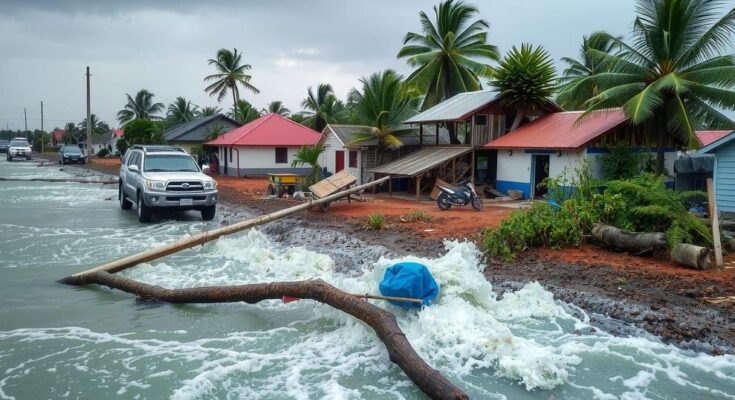The Flash Appeal for Mozambique following Tropical Cyclone Chido highlights the urgent humanitarian needs of nearly 453,971 affected individuals due to devastating destruction. With significant fatalities, homelessness, and the onset of a cholera outbreak, the situation is dire. The appeal seeks to mobilize resources for shelter, food, medical aid, and sanitation while addressing ongoing crises related to conflict and drought.
This appeal addresses the urgent humanitarian crisis following Tropical Cyclone Chido, which devastated Mozambique upon its landfall on December 15, 2024. The cyclone produced extreme rainfall and winds, resulting in at least 120 fatalities and impacting nearly half a million individuals. The damage includes the destruction of over 70,000 homes and numerous essential facilities. With over 350,000 individuals affected, a Flash Appeal has been activated to mobilize resources to tackle the widespread devastation, ensure access to critical supplies, provide emergency shelter, and facilitate recovery efforts for the damaged agricultural sector.
The cyclone has particularly impacted Cabo Delgado and Nampula provinces, where thousands are left homeless. The assessment conducted on December 18 revealed that entire communities are in ruins, with near-total destruction in some areas. Urgent needs encompass safe shelter, food, potable water, medical assistance, and sanitation provisions. Compounding the situation is a cholera outbreak, which poses additional public health challenges. Special attention is required for vulnerable populations, including internally displaced persons (IDPs), who face heightened protection risks, including potential gender-based violence and loss of civil documentation.
The humanitarian response is hindered by limited resources amidst concurrent crises, including drought and conflict affecting millions. It is imperative to replenish supplies to ensure effective disaster relief and prevent further loss of life due to disease outbreaks. The ongoing challenges emphasize the necessity of environmental resilience and recovery strategies to sustain livelihoods and support affected communities in rebuilding.
Tropical Cyclone Chido has resulted in catastrophic impacts in Mozambique, characterized by unprecedented rainfall and destructive winds. The cyclone’s peak intensity and immediate aftermath have led to widespread infrastructure damage, loss of life, and displacement of communities. The areas most affected are in Cabo Delgado and Nampula provinces, where the humanitarian needs are severely pronounced. This situation arises concurrently with other ongoing crises stemming from conflict, drought, and disease outbreaks, highlighting the multi-faceted challenges facing both responders and affected populations. A coordinated humanitarian response is critical to alleviate suffering and restore normalcy in the affected regions.
In conclusion, Tropical Cyclone Chido has resulted in a significant humanitarian crisis in Mozambique, necessitating immediate action to address the urgent needs of affected populations. With thousands displaced and critical infrastructure destroyed, the emphasis must be placed on providing shelter, food, medical care, and sanitation. The compounded effects of ongoing crises underscore the need for sustainable recovery efforts and increased funding to support humanitarian initiatives. A focused approach to protecting vulnerable communities, especially in terms of gender-based violence, is crucial for a comprehensive response to this disaster.
Original Source: www.unocha.org




